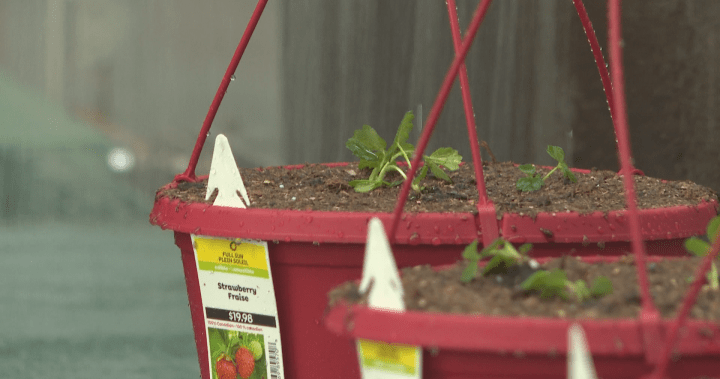Most of the plants grown at Rainbow Greenhouses in Chilliwack, B.C., are sold in Canada, but a small portion is exported to the U.S.
And if U.S. President Donald Trump’s proposed trade tariffs are implemented in early March, shipping costs are expected to skyrocket.
“We had a bunch of shipments leaving last week and we had to say we have to get these out the door really quick because if we get a 25 per cent tariff on what we’re shipping, it basically makes that totally not profitable,” said Rainbow Greenhouses owner and Stan Vander Waal.
“Not only not profitable, but we lose money in a big way.”

Although U.S., bound shipments could come with a hefty price tag if Trump’s tariffs go ahead, Vander Waal says they will take a larger hit when it comes to importing products.
“My concern is that as Canada, we lever these counter-tariffs now to basically try to resolve the problem. What I feel is, that affects us even more as farmers,” said Vander Waal.
“Our pots, our plants, our fertilizer, all those kinds of things, those are all input costs. That’s much greater than my export part. For some people, exports are higher, but I think the import side of it, if we put tariffs on all this stuff, we’re going to make the problem much worse.”

Get daily National news
Get the day’s top news, political, economic, and current affairs headlines, delivered to your inbox once a day.
The 30-day pause on U.S. tariffs has brought some temporary relief to B.C.’s agriculture sector, but there is still uncertainty about the future.
Any extra costs could be devasting for some local farmers.
“Big repercussions, big concerns. We actually have family businesses very worried about what their future looks like,” said Vander Waal.
“I talked to a guy last week. He told me, he says I got to figure out how to keep my business alive.”

After several difficult years, the BC Fruit Growers Association (BCFGA) says crops this season are looking better than in prior years.
But growers remain “very cash strapped.”
“The growers are in very tough financial shape right now. You can take a hit of one year or two years, but it’s been consistent over the last three, four years. The weather has really hit us hard and we’ve had some declines in production,” said BCFGA president Peter Simonsen.
“Our production insurance doesn’t really work well we’re finding for some of these events. Growers are in a very, very difficult position right at the moment.”
Simonsen says the easiest way for Canadian consumers to avoid paying extra for produce and support farmers is to buy local.
“I think it shouldn’t affect the Canadian prices at all but it obviously, will make the American product more expensive. And so, it is a good, a good way to displace the American product,” said Simonsen.
“We’re talking about a tariff on oranges. We don’t grow oranges in Canada, so that’s just going to increase the price of oranges, and to have a tariff on apples and probably other products that are in Canada really just helps the Canadian consumer.”

Vander Waal says farmers will need to work closely with the government to find a way to support Canadian agriculture through the trade war.
He added that some policies changes surrounding import, and export, could provide some relief for farmers.
“It’s really important that as government and farmers that we do have that conversation, we need to sit down and just say why did we get ourselves in this position? And secondly, what can we all do,” said Vander Waal.
“We have great farmers here in British Columbia. We have great farmers in Canada. Solution based, people and farmers are very resilient, but we need the government to back us and change some of the, what I call, distracting policy and regulations that have actually hampered the ability for food processors that actually want to invest in Canada.”

© 2025 Global News, a division of Corus Entertainment Inc.
https://globalnews.ca/news/11008332/big-repercussions-big-concerns-b-c-farmers-worry-about-potential-trump-tariffs/



